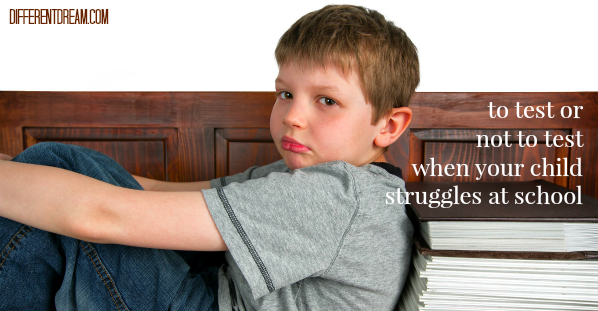When Is Private Testing Right for a Child Struggling Academically?

When is private testing right for a child struggling academically? Liz Matheis, clinical child psychologist and today’s guest blogger, offers answers by walking readers through 6 questions to determine what’s best for their child’s specific needs.
When Is Private Testing Right for a Child Struggling Academically?
#1: When your child is struggling academically and your teacher agrees with you, what do you do?
The natural next step is to reach out to the Child Study Team. Lately, I have been finding that parents are receiving much resistance regarding this step and are being sent back to the general education classroom for an intervention plan with accommodations to be implemented for 4-6 weeks. In essence, teachers are being asked to offer more differentiated instruction and try more strategies before the child can be referred for a Child Study Team evaluation.
So where does this leave our struggling child? Waiting. Waiting for intervention while more of the school year passes by. This means that both you and your child are frustrated and flailing. Speaking from experience, waiting is not good for a child who is already struggling academically.
#2: What are your options?
As a parent, you have a few options. You can wait until the 4-6 week intervention period is over and try again. You can also hire a private tutor for your child. Or, you can seek private psycho-educational testing. The last two options involve waiting and often, out of pocket expense.
If you decide to wait and your Child Study Team agrees to test at the end of the 4-6 week intervention period, you will meet again in 90 days to review the test data and determine your child’s eligibility for a special education program and related services.
#3: What are the tests involved in a psycho-educational evaluation done either through the schools or privately?
A psychological evaluation consists of an intelligence quotient (IQ) test, usually a Wechsler-based test that looks at intellectual functioning (WPPSI, WISC-V or WAIS-IV). A full scale IQ is the sum of four index scores while an educational evaluation is a measure of achievement or the different areas of academic functioning such as spelling, writing, reading and math. The Woodcock Johnson Test or the Wechsler Individual Achievement Test is used to assess achievement. The social evaluation is a review of developmental and family history of the student.
#4: What are the advantages of gaining a psycho-educational evaluation privately?
A private psycho-educational evaluation can offer you more information than an evaluation provided by your Child Study Team. A privately based evaluation can also offer you a diagnosis, such as a learning disability or attention deficit hyperactivity disorder (ADHD), where one exists. A private evaluation often consists of executive functioning testing that looks at attention, learning and memory, impulse control, and cognitive flexibility. Another piece of information that is available through private testing is the learning profile. That is, your child’s learning style–visual spatial or auditory sequential.
The examiner can integrate all of the test findings in order to understand your child as a student and learner instead of looking at discrete test scores without looking at how they are related to each other. The other major advantage to private testing is that it will be completed in less than 90 days, which means that you do not need to wait 3 months in order to gain an understanding of how your child is functioning, based on standardized test scores.
#5: When should I accept a Child Study Team evaluation?
That’s easy – if everyone on the Child Study Team is in agreement, then let them proceed with the testing. If you are looking to make the most of the data generated, you may want to consult with a psychologist, learning specialist or educational consultant in order to help you integrate the data that has been provided to you.
#6: How is eligibility determined by the Child Study Team?
Traditionally, the Child Study Team is going to look for a 23 point discrepancy (please note that this can vary from state to state and district to district) between the full scale IQ and an index score on the educational testing. This discrepancy suggests that there is a difference between your child’s cognitive ability and how they are actually performing; thus, a learning disability exists, and your child can be eligible for special education and related services under the category of specific learning disability. Your child can also gain eligibility under several other categories that vary from state to state. So you will want to refer your state’s special education law for the most accurate information.
I hope this clarifies some of the process for you when you are trying to determine when private testing is right for a child struggling academically. If you have more questions, leave them in the comment box.
Do you like what you see at DifferentDream.com? You can receive more great content by subscribing to the quarterly Different Dream newsletter and signing up for the daily RSS feed delivered to your email inbox. You can sign up for the first in the pop up box and the second at the bottom of this page.

By Liz Matheis
Dr. Liz Matheis is a clinical psychologist and school psychologist in Parsippany, NJ. She offers support, assessments, and advocacy for children who are managing Autism Spectrum Disorders, ADHD, learning disabilities, and behavioral difficulties, as well as their families. She is also a contributor to several popular magazines. Visit www.psychedconsult.com for more information.
2 Comments
Submit a Comment
Subscribe for Updates from Jolene
Related Posts
The Lessons I Learned while Raising a Child with EA/TEF
Jolene Philo reflects on a lifetime of lessons learned while raising a child with EA/TEF and shares the insights she’s won.
Looking Back at Your Child’s EA/TEF Journey
Looking back at your child’s EA/TEF journey can give parents a new perspective about past events. Guest blogger Maggi Gale shares how her look back clearly showed her how God was with their family during their daughter’s very unusual first weeks of life in 2002. Three...
How Do I Let Go of My Adult EA/TEF Child?
Valeria Conshafter explores the question “How do I let go of my adult EA/TEF child?” for EA/TEF Awareness Month.






That’s a good question. The professional needs to keep gathering evidence of need for further testing (portfolio items that show discrepancy, test scores like ITBS and class test, observational anecdotes, even video documentation, etc.) and be persistent. Hopefully, others will see the need eventually and testing will begin. Jolene
How would a professional lead the way to know when testing is appropriate or not when there is backlash from parents and other professionals?